#Queernorm Society
Text
The Black Tides of Heaven - by Neon Yang
The Tensorate has so many themes that are dear to me – gender identity, power dynamics, and a fantasy setting that is not based on medieval Europe – so, why haven’t I read it earlier? No idea. Anyway, as they say, better late than never.
Title: The Black Tides of Heaven
Author: Neon Yang
Publication Date: 26 September 2017
Genre: Fantasy – Silkpunk
Pages: 236
Standalone or Series: Tensorate…

View On WordPress
#BIPOC Representation#Books by BIPOC Authors#Books by Queer Authors#Fantasy#First in a Series#Novella#Queer Representation#Queernorm Society#Silkpunk
1 note
·
View note
Note
Happy WBW! 💜💌 What does the ideal (or stereotypical, or both if they're different) marriage/partnership look like in any of the cultures present in the world of your WIP? Is it about a powerful union of equals? Is it about chemistry and happiness? Is the end goal to produce kids? How does gender impact this, if at all? etc.! :) - @liv-is
Hi Liv! Happy WBW💜
Oh, I like this question. I've talked about wedding traditions in the Sunblessed Realm before, but not the wider aspects.
How does gender impact this, if at all?
It doesn't! This is an queernorm society, designed as a bit as a thought experiment 'let's imagine what it would be like', but mostly because writing anything else wouldn't be as much fun for me in the long run.
What does the ideal (or stereotypical, or both if they're different) marriage/partnership look like in any of the cultures present in the world of your WIP?
A formal, legally-binding marriage is typically between two people, though it's possible to modify the contract and the rites for more than two (I just didn't need to figure it out on page. There's a single wedding in the entirety of Days of Dusk AND The Truth Teller).
Also, since it's a long-lived culture (age of majority: 35, average lifespan: 300 years, but in practice until you get tired of life), people tend to get married and look to settle down once they're over 100. There's this pattern in people's lives, that if you find your vocation, something that you can do every day for your life and enjoy said life, you can in theory live forever. For the first century, people are encouraged to figure out what they want to do in their lives, and try things out. Also, promiscuity isn't frowned upon - a result of a paganism-like religion which reveres nature, and a culture with a stress on nurturing, earnest communities.
So I guess a stereotypical married couple would be 150+ yo, and have their lives more or less figured out.
Is it about a powerful union of equals? Is it about chemistry and happiness?
Nope! It's about bringing two families together. In the typical case, e.g. in Lissan's hometown, the people who'd be suspected to plan on marrying soon, would be a couple that spends a lot of time together, is often seen in each other's homes, and whose families spend a lot of time together as well. On the other hand, people without families (e.g. Erya or Gullin) wouldn't really consider marriage as something for them.
This family aspect is taken to uncomfortable levels by the nobility, who see it as a way of cementing alliances, strengthening connections, and pooling fortunes. And so, at some point later in the story Lissan is 'adopted' into a noble house, and has a partner without plans for marriage. He is pestered a lot with questions if he'd consider a union with one of the other local noble houses. Clearly if he isn't planning to marry his boyfriend, the neighbours can make a better offer, with material perks and promises of stability. It doesn't help that at the time he's in a 'friends with benefits' sort of relationship, and said boyfriend doesn't feel the need to be seen with him, or attend balls and other formal functions together.
Fortunately, it's governed by legal contracts, and marriages are not that hard to dissolve, especially with mutual agreement (see: Lissan's parents). Also, queernorm -> doesn't have to involve sexual attraction. Some people will get married for the legal perks and stability, if they'd formed a platonic bond strong enough. And a similar result can probably be achieved with a series of contracts, so marriage is almost a shorthand for that.
Is the end goal to produce kids?
On that note, adoption is a popular choice for families who want children but can't have biological offspring. E.g. the Prince of Rock, from the Southern Princedom, is an adopted son of his mothers (in the current draft of Prodigal Children).
PS. In The Fulcrum, my birdfolk doesn't do romantic partnerships at all. I know some birds irl form long-term couples and some are monogamous, but I thought it would be fun to play with a society where romantic love doesn't exist. There are strong platonic bonds, there's love for one's community, and there's the drive to procreate. That's it.
#add 'wanting to write queernorm societies' to the reasons why I don't do historical fiction#just let me have this little piece of escapism in my setting#also if anyone has thoughts on how common polyamory would be without the Western society's stigma please let me know#days of dusk#wbw#ask and i shall answer#laws and customs
5 notes
·
View notes
Text
listen the problem with queernorm in sci-fi/fantasy isn't that there's queernorm the problem is that it's very rarely done in any significantly interesting way and also sometimes having characters deal with homophobia/transphobia can tie much more neatly into the themes being presented and to avoid it so ardently is a cowardly way to minimize conflict
#sff#bookblr#like listen i love queernorm as much as the next person but like#does it say anything interesting about the society being presented? is same-sex marriage woven into the political fabric#how are transed genders treated? do they have unique roles#as was the case in many societies in history
2 notes
·
View notes
Text
Just watched Strange World and it was fun and visually interesting with a pretty standard plot focused on intergenerational friction. The gay romance wasn't really central to the plot, but there was some cute gay flirting by one of the main characters, so that's progress I guess.
#also the society was depicted as queernorm which is a plus#but that also seems pretty standard for their recent stuff
2 notes
·
View notes
Text

A Sharper, More Lasting Call for ARC Readers
Do you like dark academia? How about fantasy? How about stories set on a magic college campus? How about tragic tales? Monsters? Mind-melding drugs? Toxic best friends that can't live without each other?
All of this and more is found within my debut novel, which is currently open for ARC Readers!
After their girlfriend’s best friend is wounded in a monster attack, Simone Allard stumbles across a plot much deeper than they anticipated. As they work to find a cure to their own forming illness and find out the truth, one question remains: how was Nadia involved in this?
Nadia DuPont doesn’t know how much time she has or even what is ailing her, but it all gets more complex after meeting Simone on a field trip. As they both work to find a cure to her ailment, all Nadia is certain of is she's on the path to ruin.
Basics
Dual-POV third person present tense
Roughly 71,000 words
For fans of Ninth House, A Deadly Education, and Strixhaven
Content warnings include: Body horror, Death, Drug use, Sexual content (including mild kink), Suicidal ideation, Terminal illness, and Violence
Representation includes: nonbinary main character, black main character, main characters of color, gay main character, sapphic main character, mentions of polyamory, a main character with chronic illness/terminal illness, neurodivergent main character, side characters of color, plus-sized main character, disabled side character, queernormative society
ARC Readers will be accepted and contacted by July 1st
Completion expected by October 10th, 2024 (ASMLP's release date!)
All ARCs are digital at this time, so an email will be required.
This ARC is prior to final edits, so there may be some changes upon publication.
Links
ARC sign up form
Add ASMLP on Goodreads!
ASMLP Tag List (Ask to be added!): @magic-is-something-we-create , @wildswrites , @chishiio , @broodparasitism , @writeblrsupport , @original-writing , @artcoffeecats , @asterhaze , @linaket , @ryns-ramblings , @stesierra
84 notes
·
View notes
Text
John and Colorism
John is Māori. He is a man of color, and he is coming from a society where he was racialized. Specifically, at least as a general consensus, his "faceclaim" in a sense is Taika Waititi.
Anyway, without getting into every facet of how I think the series and fandom engages with and addresses men of color, because that scope starts getting out of this specific topic and into a different one, I want to state that I think the relationship John has to both Alecto and to G1deon actually further represents themes of colorism.
John makes himself God. He makes himself god and to him that becomes some strange performance of western civilization roman empire 2.0 space imperialism planet consumption speedrun mixed w New Catholocism or whatever, but where there's a PERFORMANCE of equality where there actually isn't. Just like I argue John not ONLY makes new classes with necromancers and cavaliers (I'm not even getting into everything else with this), but ALSO he did not in fact shatter gender oppression, he just shifted it and patted himself on the ass for it.
YES it is queernormative and as a queer man himself, it makes sense this would be important to him, just like it makes sense for it to be important to him that race manifest very differently (go pretty unacknowledged really*) across his New Roman Empire in Space. But he has his own limits and biases and I would argue both colorism and misogyny are present for him.
He chose to make Alecto the way he did. And he had all of his own reasons for it, but surely it can also be noted how linked those reasons can be to both colorism and misogyny as well. I know he made her a specific barbie that had specific history to him, but does this barbie and his choice in her also highlight his priorities, just as blatantly as his choice of empire?
I need Alecto to come out so I can finalize some of these concepts, but it is still colorism for a man of color, especially one wounded by rejection (as we see in Nona) to see power in dominating a white woman. To see a SUBVERSION in the act of it. I think John sees a lot of things as subversion without seriously considering the levels he's actually engaging in. I think John is shallow.
Which brings me also to G1deon and Pyrrha. I think John had some concepts around their dynamics, their relationship, in their interactions that was in these same lines. I think John saw G1deon a specific way, I think he passively compared himself (including how he discusses it in Nona, again), I think the way he engaged with G1deon did not show solidarity or equality (G1deon was also an engineer!) but showed presumed superiority on John's end. Also he made G1deon how he did before he crafted his 10,000 year old weird empire. If I could put it into words more eloquently, I would, but I feel like John saw triumph in G1deon being Pyrrha's necromancer and I also think he then delegated him to "attack dog" for himself (as we see in Harrow the Ninth especially!!!)
I genuinely think 100% that regardless of if G1deon is racialized as black (I think he is personally), he is meant to be darker and racialized more than John was. And I think John subconsciously compares that! I think it is instead further evidence towards a narrative on colorism, including the way he's separate from Mercymorn and Augustine through HtN.
This is without getting into Pyrrha as a cop.
*I actually don't know if I should say "unacknowledged" here, because the cavs being almost always darker than their necromancers seems really notable.
#colorism in tlt#discussion on colorism#g1deon#gideon the first#john gaius#I have already said all of this but I wanted this one to be specifically focused on this segment#I never went back and got into Pyrrha as a cop but I just don't have the energy currently
72 notes
·
View notes
Text
Book Reveals for Round 1 of Mystery Book Tournament
titles and descriptions under the cut
The One with The Obnoxious Legal System is A Conspiracy of Truths by Alexandra Rowland
The world's most obnoxious old man has been arrested for charges of witchcraft by the world's most obnoxious legal system. The story follows him utilizing every tool at his disposal to escape death including his fruity apprentice, his ever-tired lawyer, and most of all stories. Half of this book is the old man telling a story to someone he is either trying to sway, trick, or simply entertain.
The One with the Rightful Heir is Magyk by Angie Sage
A child soldier nearly freezes to death and so must join the escape of the rightful heir, a powerful wizard, and the rightful heir's bumbling dad, brother and dog.
The One with No Indoor Plumbing is In Other Lands by Sarah Rees Brennan
Have you ever thought ‘hey going to a magical fantasy land might suck a little’? Our intrepid hero has been invited to a school for future heroes in a land of elves and trolls, harpies and mermaids…and there’s no indoor plumbing. Also they’re training children as warriors and have little to no respect for diplomacy.
The One with Vampires and Farms is The Queen of Darkness by Miguel Connor
In the far-flung future, the earth is irradiated and vampires rule the world. Humans are kept in farms, and our protagonist is sent to one to learn about an illness that is appearing in the humans which can infect and kill vampires. There he learns about the human cult, and gets told by them that vampires were once human.
The One with Possessed Nuns is Vespertine by Margaret Rogerson
A young nun in fantasy-France lets a powerful revenant take possession of her body in order to protect her monastery from possessed soldiers. No one believes she can possibly control the evil creature, but as she uncovers a sinister plot at the very heart of her country, she finds herself growing closer to the revenant by the day.
The One that Becomes Queernormative is A Strange and Stubborn Endurance by Foz Meadows
Protagonist starts off in a queer phobic society and is bound to marry a girl from the neighboring kingdom against his wishes, being gay. When his sexuality is dramatically revealed after he's being assaulted, the political bets seem off, but the other kingdom is queernormative and instead offers to marry him to his bride's brother instead.
The One with Sisters and Unsuitable Men is An Earthly Knight by Janet McNaughto
The main character's older sister has run away with an unsuitable man so it's up to her to marry a suitable one. But as she worries for her sister and hopes to find her, she encounters a strange man, rumored to have been kidnapped by the fae.
The One with the Magic Italian Notebook is City of Masks by Mary Hoffman
The main character, a young boy, is seriously ill but his life is transformed when an old Italian notebook gives him the power to become a stravagante, a time traveler with access to 16th century Italy. He wakes up in another time and place during carnival time and meets a girl his own age who is disguised as a boy in the hope of being selected as one of the Duchessa's mandoliers. Political intrigue ensues.
The One with the War Against Colonizers is Fire Logic by Laurie J Marks
The last living member of a border tribe, a deadly philosopher-soldier, a truth-seer, a gentle man, and a man who can see the future form a beautifully queer family around a drug-addicted blacksmith who holds the power of the land itself so that she can end the war against colonizers that has continued for 30 years
The One with the Healer's Quest is Dreamer's Pool by Juliet Marillier
The first in a mystery fantasy trilogy about a wrongfully imprisoned healer and her quiet but strong prison friend who get busted out of prison by an otherworld being. In exchange, for seven years she must endeavor to help anyone who asks for it. A gentle local prince has fallen for his fiance through their sweet and poetic correspondence but is shocked by her cruelty when she arrives, can the healer discovers what has happened and help solve his problem?
The One with Imaginary Friends is Hexwood by Diana Wynne Jones
A pre-teen girl who relies heavily on the advice of her four imaginary friends goes into the local patch of woodlands one day and discovers it's much bigger on the inside. There, she meets a depressed sorcerer/assassin who makes a child out of her blood and his to fight against his enemies on another planet. Meanwhile, someone on Earth has started up a machine that's said to be able to make dreams come true, and this is a big problem for the evil interstellar megacorp that's been dumping prisoners on Earth and stealing their flint.
The One with a Time-Traveling Dragon/Furnace is If That Breathes Fire, We're Toast! by Jennifer J. Stewart
A boy moves with his mom to a new place where he meets a girl and a time-traveling dragon/furnace who teaches him about himself.
The One with the Multiverse is Nine Princes in Amber by Roger Zelazny
An amnesiac man finds himself embroiled in deadly political scheming, thrust into a strange multiverse in the hope of trying to claim from out under his various rival siblings feet the throne to the city at the center of reality.
The One with Mage Trials is Spellslinger by Sebastian de Castell
In a magical society one must complete their mages trials by 16, or else become a slave to that society for the rest of their life. The main character is a 15-year-old boy who has one last chance to complete his trials. Only, his magic is gone. With his fate looming, he meets a mysterious traveling stranger who shows him a different path than the one that has been laid out for him by his people.
The One with the Loser Noble Scholar is Swordspoint by Ellen Kushner
Loser noble scholar shacks up with the best swordsman of the city and makes him fight a bunch of duels mostly out of boredom but also a bit because of politics. Feels slice of life ish though there are stakes
The One with the Nonbinary Cleric is The Empress of Salt and Fortune by Nghi Vo
In this novella set in an imperial Chinese inspired fantasy world, a nonbinary cleric investigates the story of an empress and her ...controversial rise to the throne, as told by an elderly handmaiden who knew her.
The One with Geese is Thorn by Intisar Khanani
Between her cruel family and the contempt she faces at court, the Princess has always longed to escape the confines of her royal life. But when she’s betrothed to the powerful prince, the princess embarks on a journey to his land with little hope for a better future. When a mysterious and terrifying sorceress robs the princess of both her identity and her role as princess, the girl seizes the opportunity to start a new life for herself as a goose girl.
The One with the Teenage Witch Coven is The Scapegracers by H. A. Clarke
Lesbian teenage witch accidentally becomes adopted by popular girls. They form a coven and vow to get revenge on those who have been wronged. Chaos ensues.
The One with the Angel and the Demon is When the Angels Left the Old Country by Sacha Lamb
A demon and an angel decide to go to de goldene medina to search for a girl they know who's disappeared on the way over.
The One with an Unsettling Future is Zel by Donna Jo Napoli
High in the mountains, a young girl lives with her mother, who insists they have all they need -- for they have each other. The girl's life is peaceful and protected -- until a chance encounter changes everything. When she meets a beautiful young prince at the market one day, she is profoundly moved by new emotions. But the girl's mother sees the future unfolding -- and she will do the unspeakable to prevent her daughter from leaving her...
The One with the Bioweapon is Hell Followed With Us by Andrew Joseph White
It's post an apocalypse, that was started by a cult, that twists people into horrible body horror monsters. A trans boy raised in the cult is infected with a bioweapon by them and shortly after escapes. He joins a group of queer teens where he finds friends a community, and he bands together with them to take down the cult.
The One with Arabian Nights AND Hades & Persephone is Keturah and Lord Death by Martine Leavitt
Arabian Nights + Hades and Persephone! A mysterious danger plagues an unexpected kingly visit, and a young woman embarks on a quest to find her one true love before all is lost...
The One with the Lion is Sarah's Lion by Margaret Greaves
A princess longs to travel so is locked in her room. A lion comes to her. Eventually, she has to choose whether she will stay or go.
The One with the War Veteran is The Curse of Chalion by Lois McMaster Bujold
War veteran with chronic pain contracted by a goddess to save her chosen queen
375 notes
·
View notes
Text
Queer Metaphor and Queer Literality
People have been comparing Our Flag Means Death and Good Omens a lot, but the similarity that stands out most to me is on the meta level of how they do their storytelling. I think they both feel like a similar flavor of meaningful queer story because they depict queerness at both a literal and a metaphorical level, where the positive elements occur at the literal level and the negative elements are depicted through metaphor.
On a literal level, both series are full of explicitly, textually queer characters who have actual romances with kissing and everything. Characters can be trans and express their gender in non-normative ways without reprecussions (mostly). There's almost no depiction of overt homophobia onscreen. I'm not sure whether Neil Gaiman or anyone else involved in GO has talked about this choice, but I know David Jenkins has said that he wanted to avoid making the characters in OFMD constantly deal with homophobia and queer trauma. It's not that they take place in queernorm worlds, exactly; it's more that the bad stuff largely happens offscreen. (I've addressed this in an OFMD meta about season 1.)
But the thing is, neither show actually shies away from depicting homophobia and queer trauma - it's just that they happen at the metaphorical level.

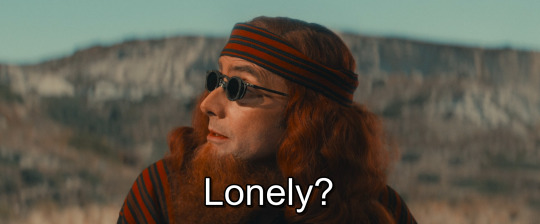



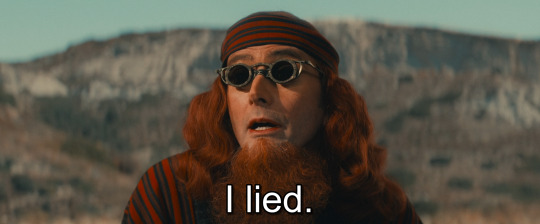
In GO2, both Crowley and Aziraphale's relationship to heaven and hell is, metaphorically, that of queer people to a stiflingly heteronormative society that will never truly let them belong and be themselves at the same time. They find community in each other - they are the only people in the world who have experienced the things they've experienced (and isn't that a relatable queer feeling!), and they also find community in queer humans, in a way. But to their home societies that originally gave them belonging and purpose, they're outcasts, and that's very lonely for both of them. They both deal with this very differently; Crowley abandons heaven and hell entirely and embraces his outcast-hood and independence (even though it's still lonely), while Aziraphale still longs for that sense of belonging and eventually decides to try to assimilate again (even though he can't really be himself there).
There's a lot more you can say about metaphorical queerness in GO (like in this recent Tor.com article). But basically, Crowley and Aziraphale's differing reactions to the ostracism of their native society mirror two different ways a lot of real life queer people respond the ostracism of their native societies, even though Crowley and Aziraphale themselves don't really face explicit homophobia for their queer romance onscreen.
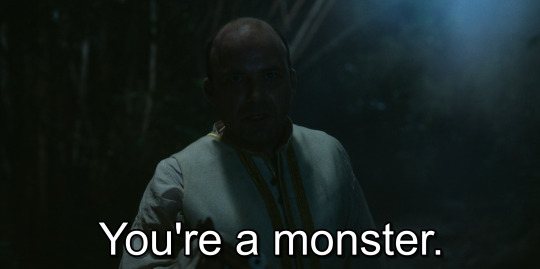

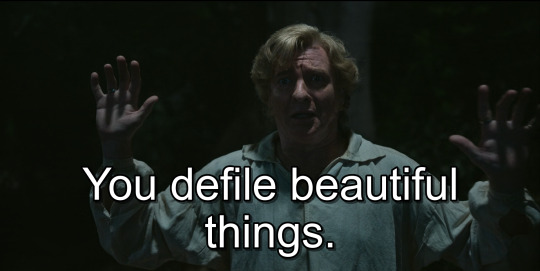
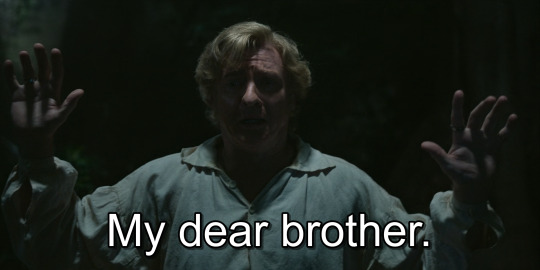

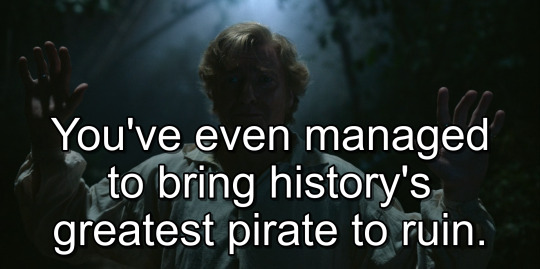
OFMD intertwines the metaphor with the literal in a different way. In a way, piracy is a metaphor for queer community; we've all heard Izzy's "piracy is about belonging to something" line in the trailer (even though we don't know the context yet.) But pirates also commit acts of violence, and most people consider them horrible monsters. Stede and Ed both struggle with feelings of monstrousness that are about their piracy-related actions on the surface; but those feelings are instantly and horribly recognizable to a lot of queer people. Chauncey Badminton's "you defile beautiful things" speech is burned into my brain in part because that's exactly what my internal monologue sounds like sometimes (and I think you can pretty easily interpret that speech as being about Stede being literally queer as much as it's about Stede killing his brother; Badminton comes just short of outright saying it.)
When Stede leaves Ed, Ed dives headfirst into being the monster everyone believes him to be. He hates himself; he thinks he's unlovable; he commits as many atrocities as he can in the hope that someone will put him down, and he'll deserve it. I think he feels that Stede left him because Stede, too, saw him as an irredeemable monster, and he tries to make it true to justify his own self-hatred. Ed's self-destructive rampage is an over-the-top expression, in the context of a pirate story, of some deeply recognizable and relatable queer emotions. It's easy for society to make us feel monstrous; Stede dealt with that by trying to remove his influence from the world and return to the (heterosexual) status quo, and Ed dealt with it by trying to live up to the monstrousness he felt inside himself until it destroyed him.
I think one reason these two shows have been so effective - and been effective in similar ways, to more or less the same group of fans - is that this combination of literal queer joy and metaphorical queer suffering feels like a very deep, authentic, relatable portrayal of queer experience. It's fun and wish-fulfillment-y, and avoids getting too close to the reality of the negative experiences a lot of fans have probably had. But at the same time, it filters those negative, complicated, and familiar experiences through the lens of the fantastical, which gives them a certain clarity and emotional grandeur that they couldn't have in a work more true to life.
I'm pretty skeptical about equating "representation" to quality (I've read a lot of deeply mediocre queer books), and I don't think it's quite accurate that these shows have been so successful simply because they depict queer protagonists in queer romances; I think that take misses something, because in this day and age, there are a lot of queer romances out there and easily accessible. But I think the way queerness is embedded into multiple levels of storytelling in both these shows gives them a lot more depth of meaning and emotion, and I think that's a big part of what fans have latched onto.
#our flag means death#ofmd#good omens#ofmd meta#good omens meta#ofmd stede bonnet#ofmd blackbeard#ofmd os#ofmd s2 spoilers#ofmd spoilers#ALSO if you like stories that are queer on both literal and metaphorical levels of storytelling#please watch revolutionary girl utena and sarazanmai
115 notes
·
View notes
Note
thank you for your response! I guess queer suffering isn't the right word for it, but generally queer suffering is what is taken out when a work is queernorm (at least that's what I've noticed). so I assumed that's the part people generally want to get rid of the most. at the same time it's like. there's historically been so much joy and community that's been built and nourished from those wound sites, that -- if that's taken away, doesn't that mean it all gets taken away? i remembered a past quote you posted about how butch/femme are not just aesthetics but roles born out of a need to protect each other from cops, from bigots, from a homophobic transphobic community. if you create a society where cops smile at you when you walk past and there's no need for those roles bc there's no bigots nor homophobes/transphobes, then -- what are we then, without that history? without that community aid and self defense? though that's probably what you meant that everyone ends up being very straight haha
see, right there. the role of the police officer in the queernormative world.
who is he targeting in this world? who is he given tacit permission to target? why is that normal? in what ways have his position been normalized? how has the violence and oppressiveness of policing been disappeared and normalized? is the story purporting that being a cop is both a normal and neutral thing for someone to be? how does that relate with queerness? how on earth have we disappeared all violence against queer people while the violence of policing remains unchallenged? queer is normal but there are still cops, jails, prisons, and police? what on earth are we really transforming and how far does it go?
75 notes
·
View notes
Text
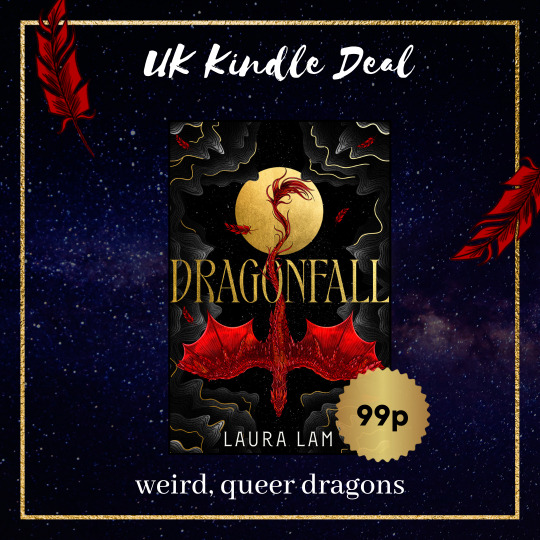
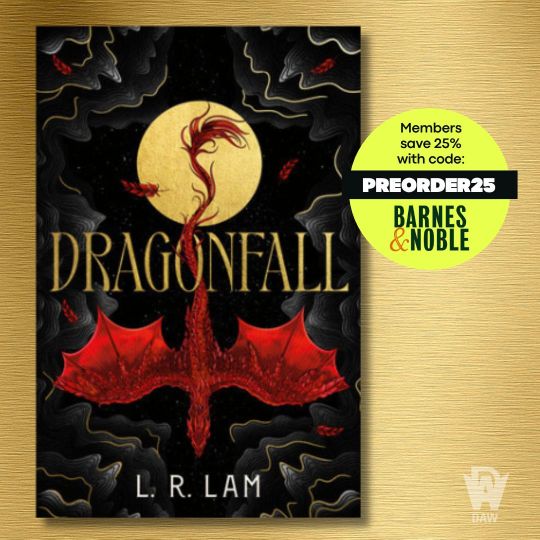
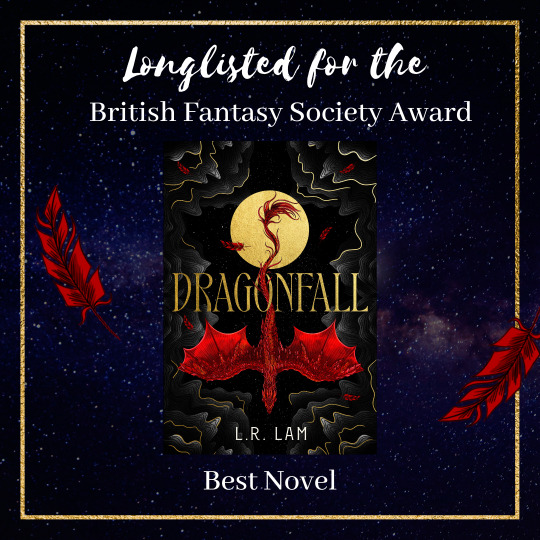
I was supposed to be able to ignore social media all this month, but I keep having stuff to announce. Anyway:
1. Dragonfall got longlisted for the British Fantasy Society Award, which was unexpected but delightful. If you're a member you can vote for the shortlist until Feb 20th. Not really expecting the shortlist since the list is stacked, but still happy to be longlisted. I'm aiming to bring a different approach to gender in epic fantasy with this book, in a genre that is usually fairly traditional in its depiction of gender roles in the name of 'historical accuracy.'
Side note, but I've found it...interesting when one of the early, pre-pub reviews I saw (before I stopped looking) complained that the book 'ranted about my gender agenda' when the book has two very short scenes explicitly about gender. Maybe 3 pages in total in a 400+ page book? The first is the last male dragon who has been raised among only women getting a quick primer on how gender works in Loc after he's fallen to the human world and is trying to pretend to be a human himself (he's not very good at it), and the second is the nonbinary character sharing their own experiences of gender. The rest of the time it's just embedded since it's a queernorm world.
I've felt a bit hurt by that, to be quite honest--as a femme presenting AFAB nonbinary person, it reminds me of the occasions where I try to remind people that yes, I am nonbinary, and they'd rather still pretend I'm a woman because I look like one and it's easier for them to not have to think about it. Also no group is a monolith, so even some other NB readers might bounce off the way I want to talk about gender, which is fine.
On the flip side, I've received really, really lovely notes from nonbinary and gender non-conforming readers who have felt it's one of the very rare times they've seen themselves represented in fantasy. and that's been really lovely. It's basically why I published the book, even though it was quite personal, and, as the years go on, I find myself increasingly bruised by trying to release art that means something to me in late-stage capitalism. I spent a lot of time last year seriously wondering if I was going to quit publishing once I finished my contracts, I found it so exposing this time around. I cherish every note from a reader that helps me remember my words connected with someone.
2. I thought Dragonfall was only going to be 99p for one day on Amazon UK, but it's still cheap. Grab it if you're in that geographical location if you like.
3. If you're in the US, Barnes & Noble is doing a pre-order sale so you can use PREORDER25 to get 25% off the paperback of Dragonfall, out in June, or you can go to the B&N Emberclaw page and maybe see the cover for it even though it's not yet been officially announced. You didn't hear this from me and when it's officially revealed you have to promise to still act surprised, okay?
https://www.barnesandnoble.com/w/dragonfall-l-r-lam/1141941880?ean=9780756418922
https://www.barnesandnoble.com/w/emberclaw-l-r-lam/1143890903?ean=9780756418441
Thank you for reading. Ask me about my gay dragon gender agenda.
#dragonfall#epic fantasy#will promotion never stop feeling awkward#no#and yet we persist#in the name of weird queer dragons
21 notes
·
View notes
Text
In BG3 we get canon bi and pan characters in a queernormative society and now the biphobes and panphobes are coming out of the woodworks with their bigotry, accusing queer members of the community of being homophobes/gayphobes/lesbophobes, and policing people's "straight-passing" ships.
I am hexing ya'll. I hope your pillow is hot on all sides. I hope your noodles or pasta always turn out soggy. I hope you always wet your socks. I hope the people around you always chew too loud. I hope you squeeze out too much toothpaste. I hope your phone screen cracks. I hope-
27 notes
·
View notes
Text
Looking for test readers
I'm splitting Taste of Copper in two bc agents and publishers don't like lengthy debuts, and I'm not going to try self publishing again unless I have to. Means both parts need to stand on their own, and that means revision.
I'm candidly looking for beta readers willing to read through 88k words and tell me what they think in this context, and general feedback, there's no fixed deadline but please don't just ghost me, only contact me if you're sure you can finish. I need comps too, can't think of anything besides GOTxBRIDGERTON.
I can't afford paid services or swaps at this moment.
Eye-catching details:
low-key fantasy, soft magic systems (aka The Magic Causes The Problems) in medievalesque setting;
queernorm setting (=queerness is normal in the setting);
sun and moon imagery with Sunshine Cheeky Love Interest falls first and Overthinking Yet Oblivious Moonlight Protagonist falls harder;
protagonist is asexual demiromantic, love interest is bisexual and very romantic (and very respectful of boundaries because it's sexy);
sociopolitical intrigue mostly based on the protagonist trying to Bedazzle Bespoke Bewilder his way through reforming society and gathering a pack of troublemakers to help him do so with investigations and trials (it causes more trouble);
festivals, balls, parties, teamaking, card games over tea, strategizing over tea, turning rivals into friends over tea, the usual;
opinionated horses;
equal focus on the pairing and on enacting large scale projects (writer is aroace and a plotter).
I'm especially looking for aspec readers <3
Let me know you're interested with a message on here. I can give you a google docs or a file in an email, just fill out the questionnaire I'll also link/send you.
Current pitch and first chapter (380 words) below cut. Here's a moodboard

Taste of Copper - Pitch
Ambrose Adenhart grew up walking the line between the noble mundanity and the wild mystical woods, ever restless, ever poised. He’d thought his duty in life was to inherit the Northern Doyen title and rule the Clifflands under the guidance of the Golden and Silver Crowns, healing his home after war and plague swept over it thirteen years before, killing his mother and poisoning the waters.
But when King Edric arrives at Orchard Haven telling him he is the one to wear silver, the gentler hand of ruling, Ambrose understands his life will be yet more complicated–even though a treasure of opportunities has been laid at his bare feet, the chance to expand his ideas from the North to the whole Realm of Rysde, and the perfect excuse to explore his own feelings and wants against the steadfast interest of the charming King.
Stepping into the heart of a Realm still pulling itself together, with his heritage casting shadows and secrets over him, Ambrose has to learn to rule the viper’s nest before the attempts to crush him, his ideas and all he holds dear succeed–the number of vipers biting at his heels isn’t what matters, but Ambrose’s own relationship to the poison.
------
1 - The Apricot
Year 321 RU (Rysde United)
Second week of Late Spring
It was a warm late afternoon when Ambrose decided he fancied an apricot and changed the fate of a Realm.
To be fair, the handsome man with long curly hair wasn't supposed to be there, just napping in the Havenswood under Ambrose's favourite apricot tree. Nobody but him, his father and the gardener with her assistants were allowed in the heart of Orchard Haven.
He paused under the arched threshold, leaning against the smooth white stone. The man–certainly younger than his father, though also older than Ambrose, dark skinned and stubbled and entirely too relaxed under his tree–hadn't heard him arrive.
He fidgeted with his hands, pursing his lips and considering going back to the sunny library painted gold in the early sunset.
He could have an apricot later.
Yet, this was his orchard and the man wasn't supposed to be there.
Dark eyes narrowed, he lifted a pale hand to tug at his coppery curls.
He really wanted that apricot.
Ambrose adjusted the collar and hem of his light blue tunic so that it reached his knees, wished he'd put on shoes and breeches that morning, straightened his shoulders and marched up to the stranger dozing under his tree.
"Good afternoon, sir,” he greeted with practised courtesy. “You shouldn't be here."
The man's eyes twitched, and he opened one, revealing a hazel iris.
"I can go wherever I want in my Realm, boy," he gruffed, low and gravelly, with an amused lilt. He puffed out a breath to move a long dark strand of curly hair from his brow.
Ambrose’s face heated in a furious blush as soon as the man's words sunk in.
"Oh," he whispered, stunned. There was golden embroidery on the man’s red and black tunic, muted by the shadow of the tree. Nobody could wear gold on their clothes but the Monarch of Rysde.
He cleared his throat. "Your Majesty... you are a long way from the capital."
When had he even arrived? The castle perched on the Foxridge would have noticed something like the royal party of King Edric proceeding through the cultivated Clifflands.
"Aye, I've come for you, little lord." The King squinted up at him and grinned. "You’re to be crowned."
#writeblr#writing community#beta readers#beta readers wanted#romantasy#fantasy romance#gay couple#asexual characters#bisexual characters
4 notes
·
View notes
Note
It is not 7 am anymore but top 5 books read this year? 😄
I have read 44 books so far this year and most of them were very good so I don't know how I'm supposed to pick just 5 :'''D
in reverse chronological order
THE DEATH I GAVE HIM - EM X. LIU
this is an utterly unhinged locked room sci-fi murder mystery retelling of Hamlet in which Horatio is an AI and he and Hamlet have a deeply co-dependent and sexual relationship. This book is exactly the kind of thing tumblr would eat up with a spoon, so tumblr pls get on this. The basic plot is: a deeply depressed and suicidal Hamlet (Hayden) is working on a formula that can make one immortal. He is obsessed with beating death. Then his dad is murdered and the labs go on lockdown and more people die because *gestures* Hamlet is Hamlet even when his name is Hayden, and Horatio the AI does his best to keep Hamlet alive and also be a voice of reason except he's too biased. By happenstance I had read this Hamlet/Faust crossover fic (Hemlock & Wine) before reading this book, and in this fic Hamlet is obsessed with necromancy and Horatio is trying to save him. it set the mood nicely.
You know how in Hamlet everyone dies and at the end Horatio is the only one alive with Hamlet dead in his arms? What if I told you in this book it's reversed?
WILD AND WICKED THINGS - FRANCESCA MAY
Dark, witchy, historical fantasy - set after WW1 on a fictional island off the Yorkshire coast, very 20s glam with a dark undercurrent. Witchcraft is banned, but Annie is a witch. when her father dies she inherits his house on Crow Island and goes over there to sort that out and rents a house next to what turns out to be a Den of Iniquity, not just because of the lavish parties with illegal (magical) substances but because it's queer. Then follows a dark plot involving a blood debt and necromancy and power hungry men (well, one power hungry man) and fragile old and new relationships and dark secrets and also Annie and Emmeline get accidentally magically bonded to each other (but also are in love/lust with each other) and look, I could not stop reading.
DRAGONFALL - L.R. LAM
listen I LOVE dragon books and I've read and loved everything L.R. Lam has written so when I heard an epic dragon fantasy was coming? I WAS STOKED. this is the first in I think a trilogy and it ticks all my boxes:
sentient dragons with their own history, language, society, etc
sexy dragons?? i didn't realise i needed sexy dragons until I read Aliette de Bodard's Dominion of the Fallen trilogy or the Invisible Library series by Genevieve Cogman, but hey. SEXY DRAGONS
queernorm world! our second protag Arcady is nonbinary and uses any pronouns, thank u for your service L.R. Lam
very cool world building and magic system
BETRAYAAAALLL
I can't wait for book 2
PORTRAIT OF A THIEF - GRACE D. LI
look this post will explain everything. suffice to say: pretentious college students steal priceless art.
THE BEAUTIFUL ONES - SILVIA MORENO-GARCIA
This is a kind of historical romance but it's fantasy and it doesn't follow conventional romance novel structure (I was SO nervous it wouldn't end happily because I didn't know what to expect from the narrative I was being given, but THANK GOD IT DID). it's very fantasy of manners. it makes a lot of pointed commentary about colonialism and colourism. it's absolutely lush. I love this book a lot, it was so engaging and gripping. the characters are allowed to be flawed and assholes and complex and weak and kind - it's very similar to sprawling historical/saga books with a large cast of people with conflicting wants and needs and scheming and tragedy and love and all that, but distilled into a neat compact package focusing on three people. It's not a long book, it's quite a slim volume for what it is, but it's perfectly paced so you don't notice that you're not actually reading a 900 page family saga.
other standalones I read this year that I think are WELL worth reading:
CAMP DAMASCUS - CHUCK TINGLE
YOU MADE A FOOL OF DEATH WITH YOUR BEAUTY - AKWAEKE EMEZI
YELLOWFACE - R.F. KUANG
HONOURABLE MENTIONS GO TO:
two series I read this year that I also absolutely loved
THE SEVEN DEVILS DUOLOGY - ELIZABETH MAY & L.R. LAM
you know this post right?

[image id: post by worflesbian on july 4 saying 'sci fi is when women in tank tops are covered in grease and sweat and are shouting at people and racing against time to save lives' reblogged by leafcrunch on july 13 with a screenshot addition of the tag #half a jumpsuit!!! you forgot half a jumpsuit!!!!']
this is that series. it is rebels in space overthrowing an evil space empire. it's all the worst bits of imperialism and colonialism and patriarchy distilled into one evil empire and all the best bits of firefly and star wars distilled into the rebellion. there are cool scifi science bits. this would be amazing as a two season series by competent tv makers, it's very cinematic in scope, but the characters are what give this life.
THE WINTERNIGHT TRILOGY - KATHERINE ARDEN
this is a family saga of a kind, set in medieval Russia during a time when Russia was being Christianised. I don't know how to explain this series because it's so complex and so rich. There is a main character - Vasya - but other characters also get POV sections. the first book takes quite a while before we even get to Vasya in 'the present' so to speak, this is a trilogy that isn't afraid of taking its time to tell a story. Vasya is a witch who can see/communicate with Russian 'folklore' spirits, these spirits are fading with the coming of Christianity. There is an unhinged priest, the winter king Morozko whom Vasya has an intense relationship with, Vasya's brother (a monk, based on a real person), Vasya's sister (married to the Tsar, a real person), and just...god, I don't know. I loved everything about this trilogy, the way it humanised historical figures, the way it didn't demonise either the folklore spirits (who are allowed to be non-human beings devoid of human morality! so refreshing) or the Christians, but rather conveyed how a time of upheaval like this had to have been very scary and tumultous. an absolute treat.
I did also read the entire Charm of Magpies series by KJ Charles including the spinoffs, which I really enjoyed.
18 notes
·
View notes
Text
The past couple of weeks I've been reading a bunch of Django Wexler books, and the thing that caught me by surprise was how many of his main characters came across as fairly nuanced aspec rep, and I'm not entirely sure whether it was on purpose or not.
The first book I noticed this in was Ashes of the Sun. It and its sequels are queernorm, and textually acknowledge asexuality and aromanticism as things that are known and accepted within the setting. There are two protagonists, Maya and Gyre, and Gyre's experience of sexual and romantic attraction is deeply interesting in its absence. He has sex on multiple occasions, and seems to enjoy it somewhat, but nothing about his narration ever indicates that he has any interest in seeking it out. He never expresses a specific sexual attraction to either of his partners (or anyone else for that matter), never initiates sex, and never even seems to be thinking about sex as a possibility until someone else points it out to him. His feelings for his partners don't necessarily read as romantic, either. That part is more complicated and more open to interpretation - one of his partners is a fling, and the other deliberately avoids defining their relationship beyond "we are friends and sometimes sleep together", but he clearly feels awkward about the possibility of getting involved with other people in any capacity in spite of their explicit lack of exclusivity. However, his primary partner doesn't receive emotional priority in his narration. He treats her and thinks of her like all of his other close friends, without prioritizing her either higher or lower than anyone else.
However, neither his narration nor anyone else comments on this apparent lack of sexual or romantic interest, which is what makes the authorial intent seem ambiguous to me. In a queernorm setting where aspec people are textually a known and unremarkable part of society, it feels odd that neither Gyre nor anyone else describes himself in those terms. Given that his only partners are women, I'd normally be inclined to say that the author intended for him to allo and straight and just didn't really focus on writing sex and romance if not for our other viewpoint character, Maya. Maya's narration is chock full of visceral romantic and sexual attraction. The force of her attraction regularly hits her like a punch to the gut. At first she has to psych herself up to look her crush in the eye because every time she does her brain functions are replaced with "hnnnnnng girl pretty😳😳😳". It's such a dramatic contrast that it feels like it almost has to be deliberate. It's also worth noting that Maya's eventual partner, Beq, describes herself as having never been interested in someone before and that she hadn't ever expected to be, and as being kind of overwhelmed by the whole experience, which certainly sounds like it could be a description of demisexuality. She doesn't get a pov, though, so that's about as far as that exploration goes.
Demisexuality does come up in a different Wexler series, though. The Shadow Campaigns series is not queernorm - misogyny is dealt with extensively, and homophobia peripherally. One of the pov characters, Raesinia, spends the first half of the series utterly uninterested in romance or sex. She's not dismissive of them, or without opportunities to explore either - she simply doesn't feel either kind of attraction to anyone and never has, and is unbothered by that fact, except for when it puts her in the situation of needing to let one of her friends down gently. However, over the course of two books and about a year and a half in universe time, she develops a friendship and mutual respect with one of the other pov characters, Markus. In spite of a few comments from some of their other friends, Raesinia's feelings for him are pretty unambiguously platonic, with the most she'll concede to her friends' teasing being that he seems and looks nice enough, I guess. However, eventually her feelings for him begin to shift, until eventually she expresses a romantic interest in him. Again, this is not a queernorm series. One of the pov characters and several other main and supporting characters are unambiguously queer, but there's no in-universe cultural awareness of aspec identities, and no one remarks on them as a possibility. Again, here is where I would normally assume that the author intended to write a slowburn between a two allo heterosexual characters, except. There is a specific point in the story, years since they first met and months after they became romantically involved, where Raesinia specifically and dramatically experiences sexual attraction for the first time. And the degree to which that is emphasized by the text makes me think that her demisexuality might have been purposeful.
Ultimately I'm not really concerned with authorial intent; the text is the text, and both series feature characters who read as aspec to me. But it's not often that I'm so uncertain about what the authorial intent was. In any case, it makes for compelling reading.
29 notes
·
View notes
Text
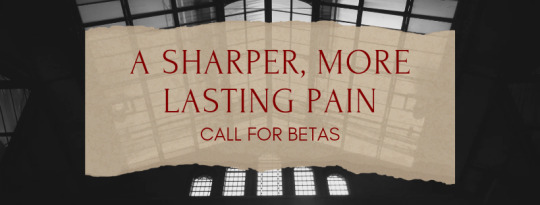
Or, A Sharper, More Lasting Call for Betas
Do you like dark academia? How about fantasy? How about stories set on a magic college campus? How about tragic tales? Monsters? Mind-melding drugs?
All of this and more is found within my debut novel, which is currently in need of beta readers!
After their girlfriend’s best friend is wounded in a monster attack, Simone Allard stumbles across a plot much deeper than they anticipated. As they work to find a cure to their own forming illness and find out the truth, one question remains: how was Nadia involved in this?
Nadia DuPont doesn’t know how much time she has or even what is ailing her, but it all gets more complex after meeting Simone on a field trip. As they both work to find a cure to her ailment, all Nadia is certain of is she's on the path to ruin.
Basics
Dual-POV third person present tense
Roughly 70,000 words, ~350 pages
For fans of Ninth House, A Deadly Education, and Strixhaven
Content warnings include: Body horror, Death, Drug use, Sexual content (including mild kink), Suicidal ideation, and Terminal illness
Representation includes: nonbinary main character, black main character, main characters of color, gay main character, sapphic main character, mentions of polyamory, a main character with chronic illness/terminal illness, neurodivergent main character, side characters of color, plus-sized main character, disabled side character, queernormative society
Searching for feedback on... anything, really, but especially on characterization, cohesion of the timeline, and worldbuilding. But again, anything (save line edits, that'll come next) is fair game.
Betas will be accepted and messaged by February 1st
Hard beta deadline of April 1st, so there's a 2 month reading period.
Beta reading will be conducted via Google Docs, so a valid Google account is required.
Links
Beta sign up form
Add ASMLP on Goodreads!
ASMLP Tag List (Ask to be added!): @magic-is-something-we-create, @wildswrites, @chishiio, @broodparasitism, @writeblrsupport, @original-writing, @artcoffeecats, @comicgoblinart, @asterhaze, @linaket, @arigalefantasynovels, @ryns-ramblings, @stesierra
105 notes
·
View notes
Text
Mystery Fantasy Book Tournament
Round 1: Poll 6
The One with a Girl and a Snake
A Lipan Apache girl tries to figure out her family's old stories which she believes are true. A cottonmouth snake from the spirit world tries to find a new home until their paths cross amidst dangerous circumstances.
The One that Becomes Queernormative
Protagonist starts off in a queer phobic society and is bound to marry a girl from the neighboring kingdom against his wishes, being gay. When his sexuality is dramatically revealed after he's being assaulted, the political bets seem off, but the other kingdom is queernormative and instead offers to marry him to his bride's brother instead.
91 notes
·
View notes